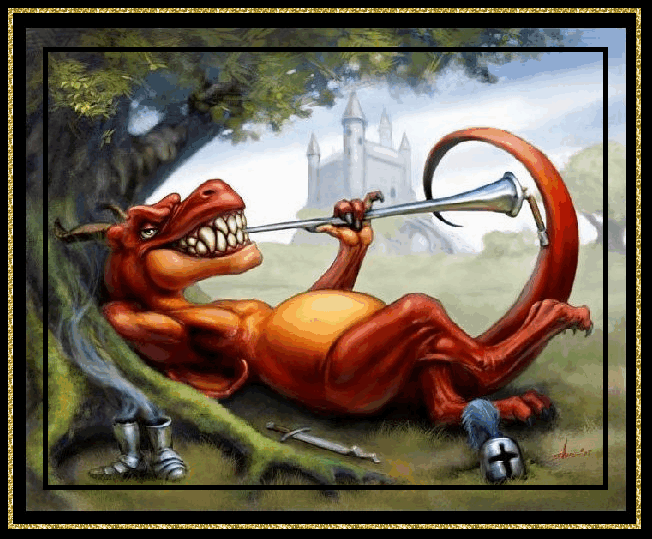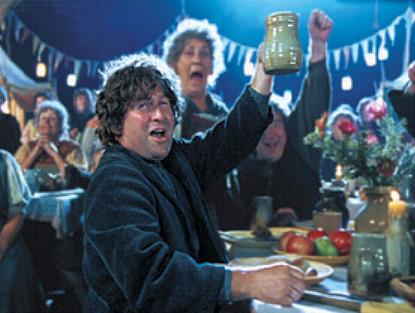Today is Thanksgiving, so naturally food is on my mind and soon to be in my belly. I read with my stomach. As a child, I did much of my reading in bed with a glass of milk and a piece of string cheese by my side. My reading tastes were often influenced by the descriptions of food found in the books I read. One of my earliest forays into the fantasy genre was with Brian Jacques' Redwall Series, and boy did that man knew how to describe a feast. For those unfamiliar with Jacques' work, the series centers around the adventures of anthropomorphized woodland creatures living in a fictional bucolic land called Mossflower. Every book in the series includes at least one feast, described in detail. Though the later books suffered greatly from uninspired formula, the feast scenes were always some of my favorites. Here's a passage from the second book, Mossflower.
Exclamations of admiration and delight greeted the food as it was served. After all, who could resist roast chestnuts served in cream and honey, or clover oatcakes dipped in hot redcurrant sauce, celery and herb cheese on acorn bread with chopped radishes, or a huge home-baked seed and sweet barley cake with mint icing, all washed down with either October ale, pear cordial, strawberry juice or good fresh milk.Stepping back, the foods described in Jacques' mouse feasts could either be some of the most deliciously rustic dishes imaginable, or really horrible hippy crap... depending on how they're prepared. I prefer to imagine them as the former. One thing I never could figure out was where the mice and other critters got their milk for cheese and cream? In the 15 Redwall books I own, I don't recall a single mention of a cow, sheep or goat.
Jacques' feasts, along with food descriptions like those from Tolkien's Hobbit feasts and the meals made in Aunt Pol's kitchen in Edding's Belgariad worked their way out of the books and into my own reading-time snacks. I favored rustic crusty bread and cheese with nuts, simple unprocessed foods that seemed appropriate for a protagonist farm-boy destined for greatness.
Unfortunately, though descriptions of foods and feasting are prevalent within fantasy literature, they are much more rare when it comes to gaming. D&D skills like profession (cook) are generally overlooked in favor more "practical" abilities that help with the everyday tasks of killing monsters and looting the bodies. One of my players did actually take some points in profession (cook) and often scrounges for food to make breakfast for the party and the group has a habit of throwing parties for the citizens living near their keep. I've been pondering ways to encourage more detailed culinary roleplaying. Perhaps I could assign minor morale bonuses for well-fed characters or devise a diplomatic negotiation encounter centered on a feast. After all, slaying dragons is always easier with a belly full of pancakes!
Speaking of modern day corruption, while driving home from breakfast, I heard a discussion of turducken on the radio, and my brain naturally imagined the turducken as a living beast. So, for this holiday I would like to leave you with a mental image of the dreaded DIRE TURDUCKEN!
This "fowl" beast is believed to have been created by a cadre of transmuters. Resembling a large cockatrice on the outside, the Dire Turducken possesses several powerful abilities that make it a truly dangerous opponent.
Special attacks:
- Reach: The Turducken has three heads, each living within the mouth of the next larger (pardon my screwy grammar). The heads may stretch out on long necks, giving the Turducken a reach of 15 feet with the smallest head.
- Swallow Whole: If the Turducken succeeds on an attack with it's smallest head, it may immediately attack with the next largest head. If that succeeds, it may attack with its largest head, and if that hits, it may attempt to swallow it's victim whole. Swallowed victims take damage from the acids and stones within the Turducken's gizzard. They may attempt to cut themselves free using a light weapon.
- Breath Weapon: The Turducken can breathe a stream of scalding hot basting juices up to 30 feet. Those hit take damage from the scalding liquid and smell mouthwateringly delicious for 1d4 days or until bathing.




No comments:
Post a Comment